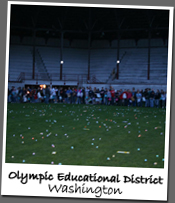The Olympic Educational Service District (OESD) had afterschool programs as early as the first part of the 1990s. But when the economy took a downturn, and local fishing and timber businesses suffered, public funding soon dried up, and afterschool all but vanished from the scene. What’s more, even while afterschool opportunities were growing increasingly scarce, the demand for afterschool was increasing, as more stay-at-home moms took jobs to support their families. In 1998, a 21st Century Community Learning Center (21st CCLC) grant helped breathe new life into the district’s afterschool offerings. Programming supported by the district’s grant focused on the most underserved children, and the program also offered Friday night events for parents and kids, social services and vocational exploration opportunities for parents. The grant’s expiration three years later, coupled with administrative delays from the transfer of 21st CCLC grant-making from the federal government to the states, created a more than year-long gap in funding. By then, however, community will to support afterschool had grown, allowing OESD to appeal to local foundations, stage fundraising events, and more. Ultimately, the district fostered the creation of a nonprofit organization called Harbor After School to support afterschool programming. It invited a diverse array of stakeholders to serve on its board, including representatives from local government, the United Way and the Parks department, thus positioning the program to build the kind of support that would sustain it in the long run. The nonprofit developed additional partnerships with the local credit union, the YMCA, local restaurants and community libraries, helping to ensure that the program was entrenched in the community for a long time to come. Those efforts were key to keeping the programs running until the next 21st CCLC grant in 2003. That grant went to Harbor After School and its long list of partners, and supported programs at three middle schools. In addition, the program enjoyed significant in-kind support from the school system in the form of snacks and space, staffing help via AmeriCorps VISTA volunteers, and funding, volunteer and in-kind contributions from local businesses. Since then Harbor After School has added a fourth site. Each offers daily programming, including an educational, recreational and enrichment component, snack and supper, and transportation home. Each month the programs offer field trips, parent nights and late night programming. The program serves junior high students, and that sometimes difficult age group has voted with its feet by returning again and again. Despite the success of the program, the future remains precarious. In the most recent 21st CCLC grant competition, Harbor After School’s grant was not renewed, and a significant cut in staffing and program capacity is expected. The largest site, which last year served an average of 100 students daily, will cut capacity to just 25 students. Harbor After School Director April Heikkila plans to stay on as a volunteer, working to keep the program running and raising funds to restore capacity. “Our community has been changed by the 21st CCLC initiative, because it has allowed for no-cost programming for our middle-school-aged students,” Heikkila says. “With our challenging economy and other risk factors, families are not always able to provide care, nutritious meals, or even a safe haven for their own children. More than 8,000 middle school students have participated in our program over the past 11 years and without the 21st CCLC grants, the majority of these students would have been left alone during the peak hours of juvenile crime and delinquency – the hours right after school!” Heikkila’s and other providers’ demonstrated devotion to the cause is a solid indication of local commitment to providing quality afterschool programming. But over the long term, increased investment is needed to sustain programs. |








